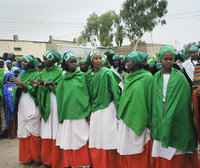Nearly 20 years ago, Somaliland, a Florida-sized region of northeast Somalia once known as British Somaliland, declared its independence from Somalia. In the years since, Somaliland has emerged as a stable, democratic state that provides a measure of international security in a region overrun with pirates and transnational terrorists. Yet, no state or international body recognizes Somaliland's independence. Instead, the international community is content with the fiction that Somalia remains a unified state. Denying Somaliland recognition will likely result in its eventual collapse and the expansion of the chaos, instability and international insecurity that characterizes Somalia. To prevent this eventuality, the United States should grant recognition to Somaliland.
Since declaring its independence in 1991, Somaliland has pursued an indigenous process of transformation from a militarized, post-conflict society governed by traditional clan structures to a representative democracy. Following the ouster of Siad Barre, the longtime dictator of the Democratic Republic of Somalia, a series of conferences of the elders of Somaliland's clans resulted first in Somaliland's declaration of independence, then in a transitional charter establishing a presidency and legislature, and finally in a provisional constitution.* That constitution was approved by 97 percent of votes cast in a Somaliland-wide referendum in 2001. Municipal, presidential and parliamentary elections were held in 2002, 2003 and 2005, respectively. The first presidential election was notable both for its narrow margin -- fewer than 100 votes separated the candidates -- and for its lack of violence. It is also notable because the victor, Dahir Rayale Kahin, is not a member of the dominant clan of Somaliland. Presidential elections scheduled to take place in 2008 were repeatedly delayed until June 2010. That largely peaceful election was judged as meeting international election standards. More importantly, power was transferred peacefully from the incumbent to the victorious opposition candidate, Ahmed Mahmoud Silanyo -- a feat unmatched by any other state in the Horn of Africa.
As Somaliland's democratic institutions have developed, so too have its contributions to international security. In the 1990s, Somaliland successfully disarmed and demilitarized its population. A nascent coast guard now keeps Somaliland's waters free of Somalia-based pirates -- despite the fact that the Gulf of Aden, the Red Sea and the waters off the coast of Somalia are three of the five locations with the highest incidence of pirate attacks in the world. Its police and judicial system have successfully broken up and prosecuted al-Qaida-linked terrorist cells. Recently, Somaliland arrested and prosecuted several Russians transporting guns to Puntland, a Somali region bordering Somaliland, in violation of the U.N. arms embargo on Somalia. Somaliland has even taken custody of transferred Guantanamo detainees.

